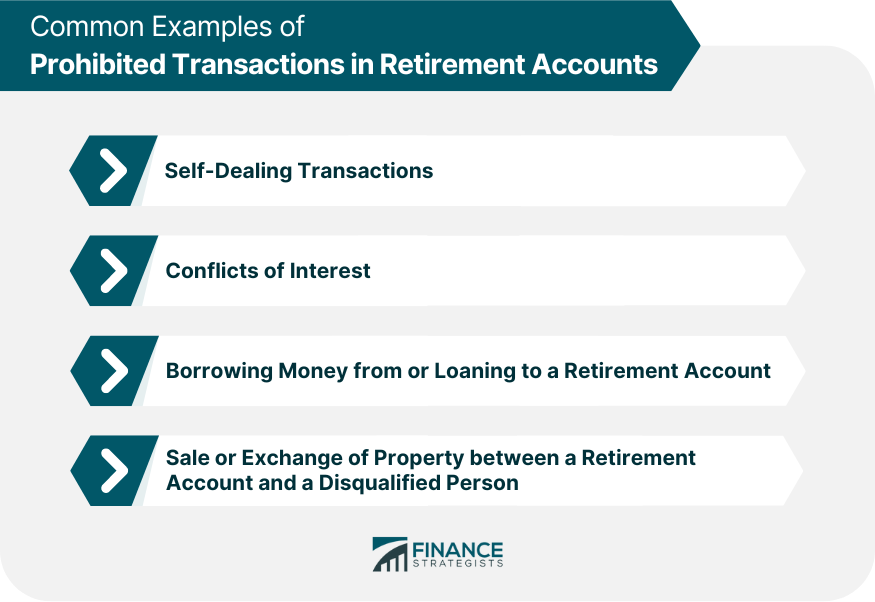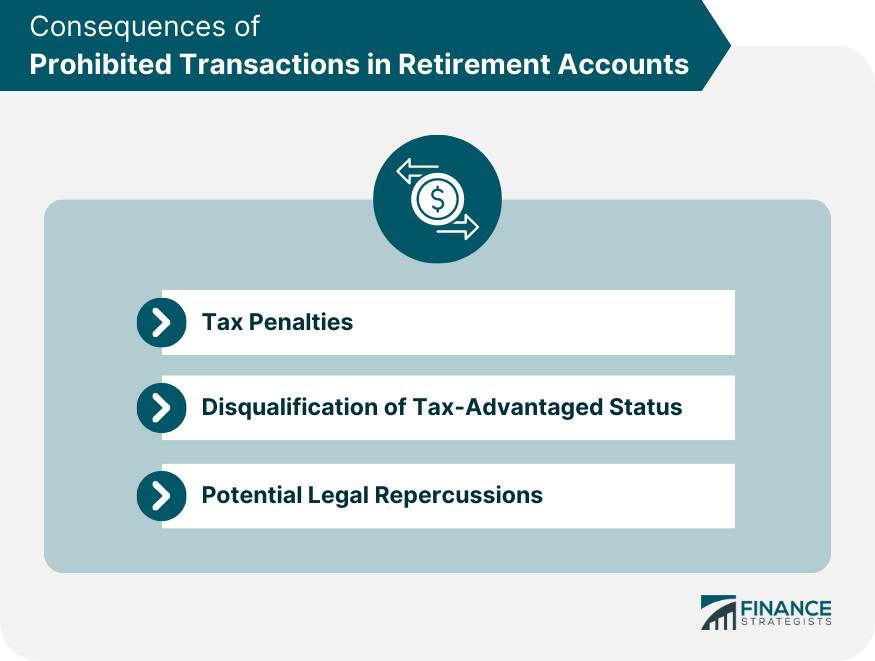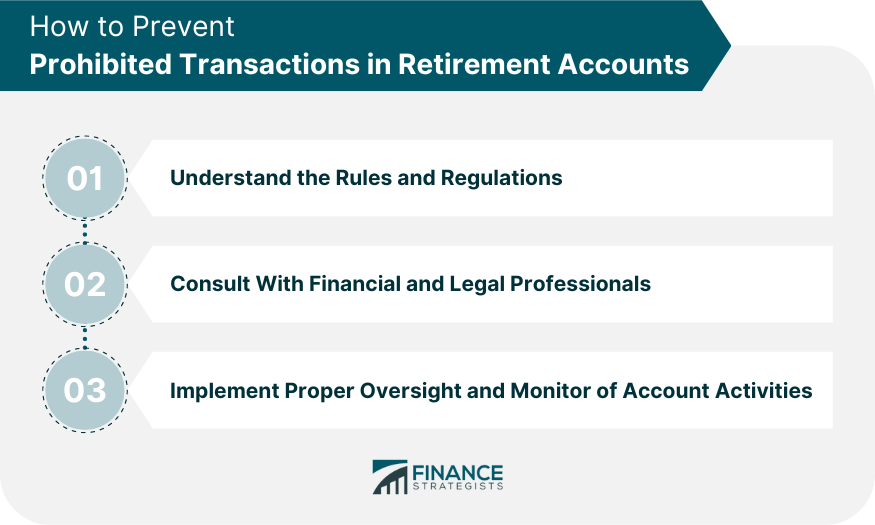Prohibited transactions refer to specific types of transactions that are not allowed within retirement accounts, as defined by the Internal Revenue Service (IRS). Engaging in prohibited transactions can result in significant tax penalties and jeopardize the tax-deferred status of a retirement account. For retirement account holders, understanding prohibited transactions is crucial to avoid penalties, maintain the tax-advantaged status of their accounts, and protect their long-term financial goals. Familiarity with prohibited transactions helps account holders make informed decisions and navigate complex regulations. Prohibited transactions can affect various types of retirement accounts, with specific rules and regulations applicable to each type of account. Prohibited transactions can occur in both Traditional and Roth IRAs, with the IRS imposing strict rules to prevent the misuse of these tax-advantaged accounts. Engaging in prohibited transactions within IRAs can lead to severe tax penalties. Employer-sponsored retirement plans, such as 401(k) and 403(b) plans, are also subject to prohibited transaction rules. Participants and fiduciaries must avoid prohibited transactions to preserve the tax-favored status of these plans. SEP plans, designed for small businesses and self-employed individuals, are subject to prohibited transaction rules. Non-compliance can result in penalties and jeopardize the plan's tax benefits. SIMPLE IRAs, another type of employer-sponsored retirement plan, are also affected by prohibited transaction rules. Participants and employers must adhere to these rules to maintain the tax advantages of SIMPLE IRAs. There are several common examples of prohibited transactions that retirement account holders must avoid. Self-dealing transactions occur when an individual uses their retirement account for personal benefit or financial gain. This type of prohibited transaction can result in the loss of the account's tax-advantaged status and penalties. Conflicts of interest arise when a fiduciary, such as a plan administrator or investment advisor, engages in transactions that benefit themselves or another disqualified person at the expense of the retirement account. This type of prohibited transaction can harm the account's performance and compromise its tax benefits. Borrowing money from a retirement account or loaning money to a disqualified person is considered a prohibited transaction. Such actions can lead to tax penalties and threaten the tax-deferred status of the retirement account. The sale or exchange of property between a retirement account and a disqualified person is another example of a prohibited transaction. Engaging in such transactions can result in tax penalties and jeopardize the tax advantages of the retirement account. Disqualified persons play a significant role in prohibited transactions involving retirement accounts. Disqualified persons are individuals or entities that are prohibited from engaging in certain transactions with retirement accounts due to their relationship with the account or the potential for conflicts of interest. The IRS has specific rules defining who is considered a disqualified person. The account holder, or the person who owns the retirement account, is considered a disqualified person. They must avoid engaging in prohibited transactions to maintain the tax benefits of their retirement account and protect their long-term financial goals. Family members of the account holder, such as spouses, children, and parents, are also considered disqualified persons. They must avoid participating in prohibited transactions to preserve the tax advantages of the retirement account. Fiduciaries, including plan administrators and investment advisors, as well as certain service providers, are considered disqualified persons. Their involvement in prohibited transactions can compromise the tax benefits and overall performance of the retirement account. Engaging in prohibited transactions can have severe consequences for retirement account holders and disqualified persons. The most immediate consequence of a prohibited transaction is the imposition of tax penalties. These penalties can be significant and have a lasting impact on the retirement account's growth and the account holder's financial well-being. Another consequence of engaging in prohibited transactions is the potential loss of the retirement account's tax-advantaged status. This can result in the entire account balance becoming immediately taxable, further damaging the account holder's financial security. In some cases, prohibited transactions can lead to legal repercussions, including civil or criminal penalties, for the account holder or other disqualified persons involved. This can further exacerbate the financial consequences and harm the account holder's reputation. To avoid the negative consequences of prohibited transactions, retirement account holders should take several proactive steps. The first step to preventing prohibited transactions is understanding the applicable rules and regulations. Account holders should familiarize themselves with the specific requirements for their type of retirement account and stay informed of any changes to the regulations. To ensure compliance with prohibited transaction rules, retirement account holders should consult with financial and legal professionals. These experts can provide guidance on navigating complex regulations and avoiding potential pitfalls. Regularly monitoring retirement account activities can help identify and prevent prohibited transactions. Account holders should implement proper oversight measures, such as regular account reviews and working with trusted fiduciaries, to ensure compliance with the rules. If a prohibited transaction occurs in a retirement account, account holders must take appropriate action by reporting the issue promptly to relevant authorities, such as the IRS or the Department of Labor. Financial and legal professionals should be consulted to determine appropriate corrective measures, including reversing transactions or taking other remedial actions. Prompt reporting and corrective actions are crucial for minimizing consequences, preserving tax-advantaged status, and reducing legal risks. Prohibited transactions are transactions banned by the IRS in retirement accounts. Avoiding prohibited transactions is essential for ensuring a secure and stable retirement, protecting the tax-advantaged status of retirement accounts, and upholding fiduciary responsibilities and legal obligations. By avoiding prohibited transactions, retirement account holders can protect their long-term financial security and achieve their retirement goals. Compliance with prohibited transaction rules helps maintain the tax benefits of retirement accounts, maximizing their growth potential and financial benefits. Retirement account holders have a legal obligation to avoid prohibited transactions and uphold their fiduciary responsibilities. Failure to do so can result in severe consequences. To avoid the negative consequences of prohibited transactions and maximize the benefits of retirement accounts, individuals should seek professional retirement planning services. What Are Prohibited Transactions in Retirement Accounts?
Types of Retirement Accounts Affected by Prohibited Transactions
Individual Retirement Accounts (IRAs)
401(k) and 403(b) Plans
Simplified Employee Pension (SEP) Plans
Savings Incentive Match Plan for Employees (SIMPLE) IRAs
Common Examples of Prohibited Transactions in Retirement Accounts

Self-Dealing Transactions
Conflicts of Interest
Borrowing Money from or Loaning to a Retirement Account
Sale or Exchange of Property between a Retirement Account and a Disqualified Person
Disqualified Persons in Retirement Account Prohibited Transactions
Account Holder
Family Members
Fiduciaries and Service Providers
Consequences of Prohibited Transactions in Retirement Accounts

Tax Penalties
Disqualification of Tax-Advantaged Status
Potential Legal Repercussions
Preventing Prohibited Transactions in Retirement Accounts

Understand the Rules and Regulations
Consult with Financial and Legal Professionals
Implement Proper Oversight and Monitoring of Account Activities
Handling Prohibited Transactions in Retirement Accounts
Final Thoughts
Prohibited Transactions in Retirement Accounts FAQs
Prohibited transactions in retirement accounts are specific types of transactions that are not allowed, as defined by the IRS. Engaging in prohibited transactions can result in significant tax penalties and jeopardize the tax-deferred status of a retirement account.
Disqualified persons are individuals or entities that are prohibited from engaging in certain transactions with retirement accounts due to their relationship with the account or the potential for conflicts of interest. Examples of disqualified persons include the account holder, family members, fiduciaries, and service providers.
The consequences of prohibited transactions can include tax penalties, disqualification of tax-advantaged status, and potential legal repercussions. Engaging in prohibited transactions can have a lasting impact on the retirement account's growth and the account holder's financial well-being.
To prevent prohibited transactions, retirement account holders should understand the applicable rules and regulations, consult with financial and legal professionals, and implement proper oversight and monitoring of account activities.
Upon discovering a prohibited transaction, retirement account holders should take appropriate action to mitigate the consequences. This includes identifying and reporting the transaction, taking corrective actions, and seeking guidance from financial and legal professionals. Timely action is crucial for minimizing the consequences and preserving the tax-advantaged status of the retirement account.
True Tamplin is a published author, public speaker, CEO of UpDigital, and founder of Finance Strategists.
True is a Certified Educator in Personal Finance (CEPF®), author of The Handy Financial Ratios Guide, a member of the Society for Advancing Business Editing and Writing, contributes to his financial education site, Finance Strategists, and has spoken to various financial communities such as the CFA Institute, as well as university students like his Alma mater, Biola University, where he received a bachelor of science in business and data analytics.
To learn more about True, visit his personal website or view his author profiles on Amazon, Nasdaq and Forbes.











